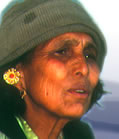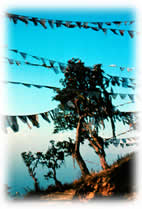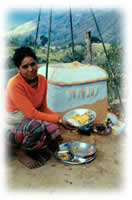 |
 |
||
 |
|||
|
RELATED THEMES festivals health water OTHER LOCAL THEMES BACKGROUND |
spiritual beliefs
quotes about spiritual beliefs"In our days we were scared to break or damage public facilities for fear of God. The children of today could not care less. When we tell them that they must not destroy our ancient heritage because it is a sinful act, they yell at us, 'What religion?' What is the point of telling them? The educated have turned out that way." "It is a pious act to make ponds, wells and water canals. That is why people in the past built them. People get thirsty while working in the field, and it was difficult to immediately get water when required. That is why when people located a natural water source in the field, they got together and dug a well. Isn't it a godly act to make water available to the thirsty?" "Some people say they are troubled by a witch.People just believe in this kind of thing.I never saw any witch. If you have faith even using only the leaf of sallo (chir pine) will cure you. If you don't have faith, even using hospital medicine will not make you well." "When [people] use Dhamis they have to sacrifice chicken and goats, it costs.at least 1500-1600 rupees. But if they go to the hospital, they spend 20-50 rupees at the most. [As a Jhankri myself] I would talk them into going to the hospital. I'd read their future [as a fortune teller] if requested, but I am against the sacrificing of chickens and goats." "They think if they do Ghewa it will reach to the dead person and they will get benefit from it. We have that custom. If we spend that much money on Ghewa, the dead person will get benefit. But I don't think like this. Because of spending so much money, even the living people will die. I don't get any benefit from it." "There were quite a few jatras (pilgrimages, fairs or religious festivals). We could comfortably witness these all night. Now since the Maoists [came] it is not the same. there are restrictions, because of the fear of Maoists.. [Jatras] have become fewer. [This year] I could not go to make offerings for my mother and father. I was afraid." "If we say this Mantra, we feel secure. When King Shirketu was doing tapasya (meditation) then kaal (death) came to take him. The King was a disciple of Shiva. Shiva came to save the King. When I used to walk alone at night, that time I would recite this shlok (song) and I would feel relaxed and safe." |
|
 Major festivals in the Hindu and Buddhist calendars are quite often referred to, and clearly mean a great deal to a number of narrators, although no one expands on the specific tenets of their faith. One narrator says that knowledge of religious texts, especially the Mahabharat, is useful for an understanding of life. Some believe in the existence of evil spirits: one person describes exorcising the
Major festivals in the Hindu and Buddhist calendars are quite often referred to, and clearly mean a great deal to a number of narrators, although no one expands on the specific tenets of their faith. One narrator says that knowledge of religious texts, especially the Mahabharat, is useful for an understanding of life. Some believe in the existence of evil spirits: one person describes exorcising the  Several narrators talk of the sacred qualities of certain rivers and water features, such as the old village ponds. One said that actually constructing these ponds (which stored water for irrigation and other uses, and were also designed as flood prevention) was itself a religious act: "
Several narrators talk of the sacred qualities of certain rivers and water features, such as the old village ponds. One said that actually constructing these ponds (which stored water for irrigation and other uses, and were also designed as flood prevention) was itself a religious act: "